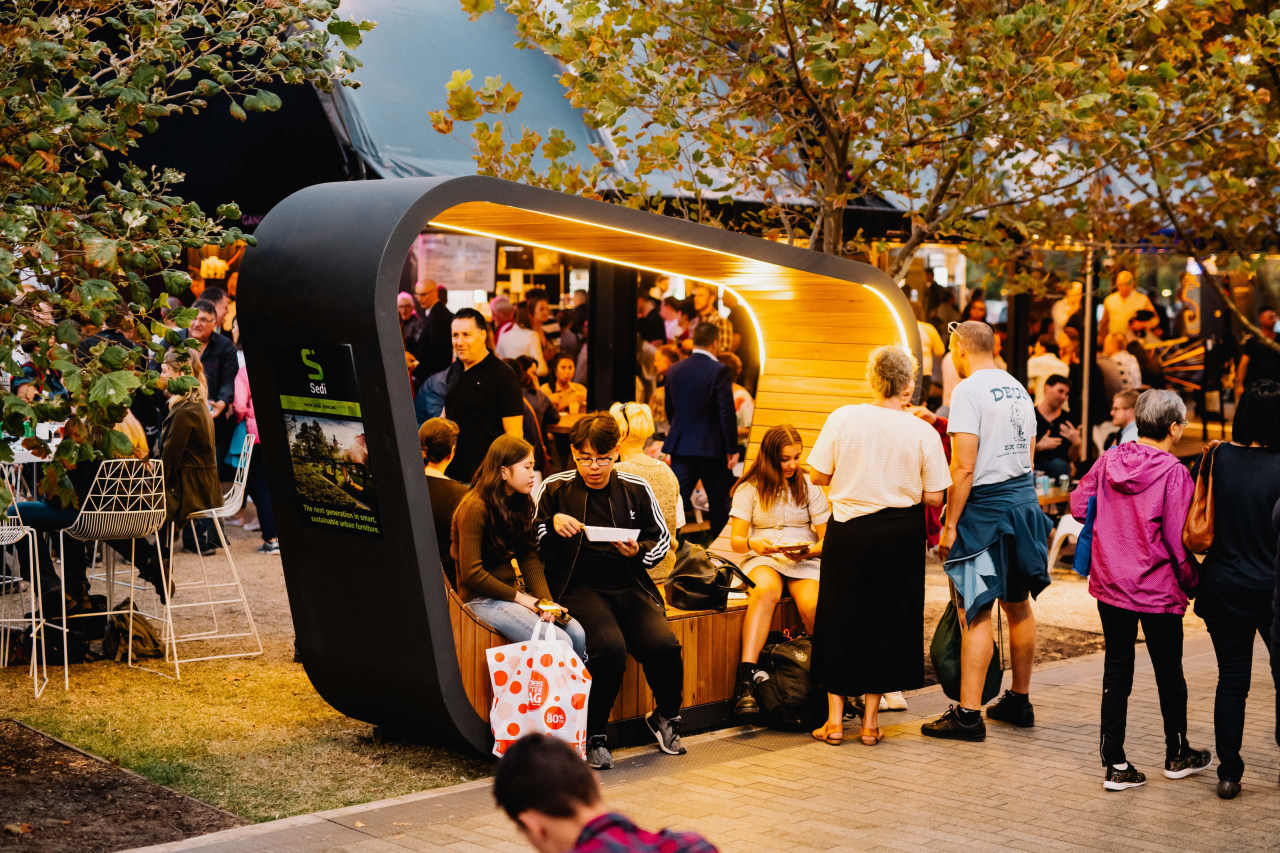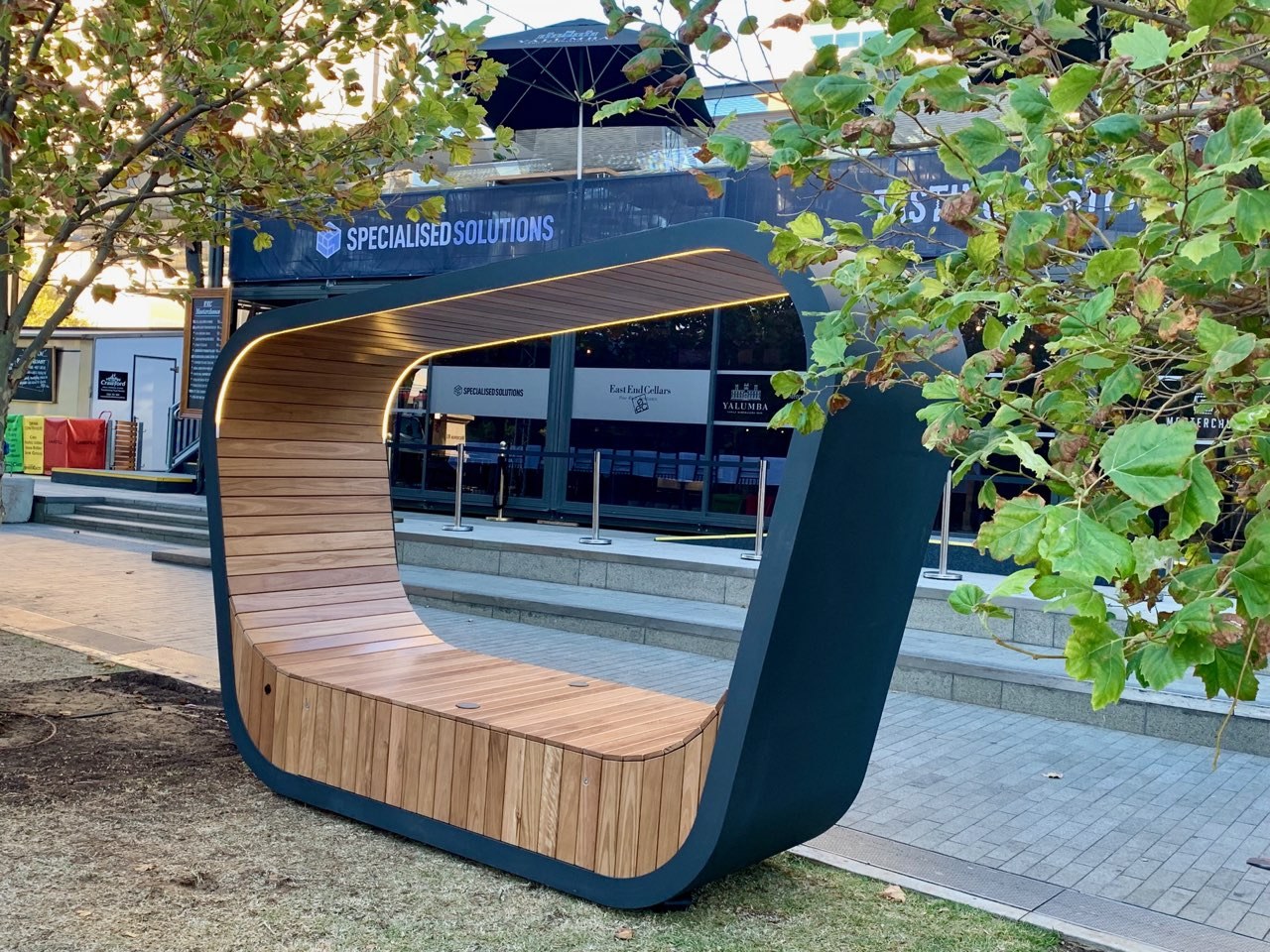Sitting pretty – self-contained solar-powered seating environments that care about people and the planet
The world is changing and seating options are expanding right along side, creating fresh opportunities for architects and designers addressing commercial outdoor environments or public venues. Prime example is the ground-breaking (grid-saving) Sedi range – pieces designed and shaped to optimise comfort and all benefitting from lighting and even screens and USB ports collectively powered by our nearest star
Designed by Sedi
From the designers:
The Sedi range of smart park benches, parklets and bus stops shelters are built from sustainable timber and steel and have solar-powered lighting, integrated charging ports, WIFI and informational screens that all run off a battery.
Bronte Modra, director of Adelaide-based modular engineering company Specialised Solutions, says he created Sedi to fill a large hole in the manufacturing market created by the burgeoning smart city movement.
“People want to be connected to the furniture and to the web, and the greater society,” says Modra.
“Everyone talks about smart cities but no one is really delivering a piece of smart furniture here.
“We just saw a real need and something that we could make out of our existing facility.”

The Sedi office is located at the Tonsley innovation district alongside technology companies such as SAGE Automation, which, together with JPE Design Studio, helped develop the furniture.
Modra decided to make the units “off-grid” to attract buyers who couldn’t connect to a power source.
“It being solar-powered gives us a lot more flexibility to where the Sedi is placed,” he says.
“With Sedi we can go to regional, remote locations and open up connectivity there.
“It’s also cost-saving measure for councils to install in the park [as] service connections are fairly expensive.”
Modra says they weren’t “reinventing the wheel” with the furniture’s individual technological features. However these add-ons were compounded to develop a new brand of smart furniture fit for a multitude of environments.
“We would like to see them absolutely everywhere: the typical bus stops on your streets, your typical parks, council parks and reserves,” he says.
“But we’re really trying to tap into is regional Australia.
“So, opening up tourism locations to maybe national parks, maybe more locations where by putting in a WIFI system gives tourists access.
“We would be looking to connect directly with councils for this.”
The Sedi shelters will sell for around $10,000 each, depending on the specific configuration ordered.
Many of the structures are now undergoing three-month trials at various locations and will also be featured at an open day at Flinders University.
“We were hoping that once the students got on them, they (the university) would see the use that it makes it hard for them to remove the structures,” Modra says.
Modra sees Queensland as a “huge potential market” for Sedi, also plans exporting internationally to Europe and is in the process of developing more furniture.
“We’re also getting into off-grid accommodation huts and units, which follows your glamping tiny-house type theme, smaller accommodation pods,” Modra says.
“We really just want to keep developing the smart features and what we can add onto the structures and see how we can improve the interaction between users and what smart cities are all about.”

The Sedi range is designed for comfort and is environmentally friendly – a self-contained seating environment with, wait for it, its own solar powered lighting and screens and wifi. It uses only sustainable building materials and the power of the sun. Think a mild steel galvanised frame, a Blackbutt hardwood timber seat, a rolled steel or perforated steel shelter and lining. looking just a little space age, the contemporary range comes in a variety of options.
- Sedi Connect – a solar park shelter
- Sedi Pause – a solar lounger
- Sedi Eat – a solar picnic shelter
- Sedi Gather – Solar Parklet
- Sedi Rest – a solar transit shelter
As the names suggest, these progressive seating elements provide for dining, socialising, resting, or simply sunning.
Story by: Trendsideas
Home kitchen bathroom commercial design









